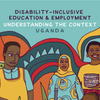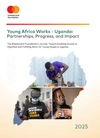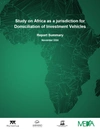Key Findings
- Ugandan policies and legislation highlight a disability rights-based agenda and a supportive policy framework on disability inclusion in education and employment.
- Challenges include exclusion from school at a young age, unfair academic assessments, and resistance to providing accommodations among employers.
- Promising initiatives to promote disability inclusion include scholarship quotas at universities and agriculture-focused capacity-building for women with disabilities.
- However, people with disabilities experience greater exclusion from education and employment than people without disabilities.
- Gaps in implementing, enforcing, and monitoring policy and legislation contribute to this exclusion.
- Future research should focus on understanding what works to promote disability inclusion in employment and education.
About the Series
Recognizing that meaningful inclusion for young people with disabilities starts with listening and learning, the Mastercard Foundation developed a research program to map the policy landscape and to hear directly from young people with disabilities.
This research was carried out in partnership with the International Centre for Evidence in Disability at the London School of Hygiene & Tropical Medicine (LSHTM), the University of Abuja, the University of Ghana, Lifetime Consulting Ltd, Addis Ababa University, University of Nairobi, Global Advocacy and Research Group and MRC/UVRI & LSHTM Uganda Research Group.
Two report series have been developed, covering the Mastercard Foundation’s seven countries of focus – the first on the context, the second elevating youth voices.
Briefs summarizing the key findings of each report have been prepared by Dr. Xanthe Hunt in collaboration with LSHTM and the Mastercard Foundation’s research team.




